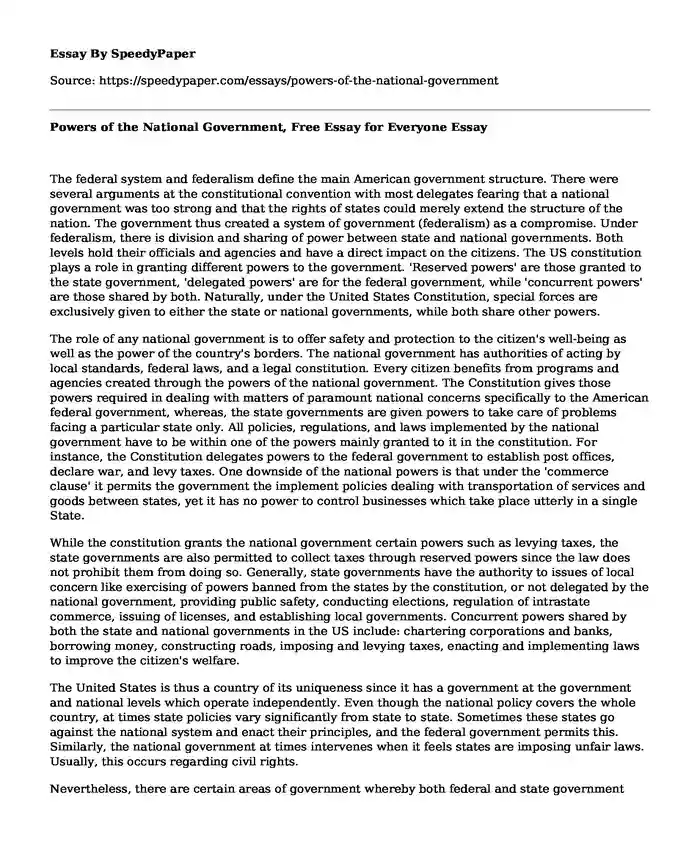
| Type of paper: | Essay |
| Categories: | United States Federalism Constitution |
| Pages: | 3 |
| Wordcount: | 568 words |
The federal system and federalism define the main American government structure. There were several arguments at the constitutional convention with most delegates fearing that a national government was too strong and that the rights of states could merely extend the structure of the nation. The government thus created a system of government (federalism) as a compromise. Under federalism, there is division and sharing of power between state and national governments. Both levels hold their officials and agencies and have a direct impact on the citizens. The US constitution plays a role in granting different powers to the government. 'Reserved powers' are those granted to the state government, 'delegated powers' are for the federal government, while 'concurrent powers' are those shared by both. Naturally, under the United States Constitution, special forces are exclusively given to either the state or national governments, while both share other powers.
The role of any national government is to offer safety and protection to the citizen's well-being as well as the power of the country's borders. The national government has authorities of acting by local standards, federal laws, and a legal constitution. Every citizen benefits from programs and agencies created through the powers of the national government. The Constitution gives those powers required in dealing with matters of paramount national concerns specifically to the American federal government, whereas, the state governments are given powers to take care of problems facing a particular state only. All policies, regulations, and laws implemented by the national government have to be within one of the powers mainly granted to it in the constitution. For instance, the Constitution delegates powers to the federal government to establish post offices, declare war, and levy taxes. One downside of the national powers is that under the 'commerce clause' it permits the government the implement policies dealing with transportation of services and goods between states, yet it has no power to control businesses which take place utterly in a single State.
While the constitution grants the national government certain powers such as levying taxes, the state governments are also permitted to collect taxes through reserved powers since the law does not prohibit them from doing so. Generally, state governments have the authority to issues of local concern like exercising of powers banned from the states by the constitution, or not delegated by the national government, providing public safety, conducting elections, regulation of intrastate commerce, issuing of licenses, and establishing local governments. Concurrent powers shared by both the state and national governments in the US include: chartering corporations and banks, borrowing money, constructing roads, imposing and levying taxes, enacting and implementing laws to improve the citizen's welfare.
The United States is thus a country of its uniqueness since it has a government at the government and national levels which operate independently. Even though the national policy covers the whole country, at times state policies vary significantly from state to state. Sometimes these states go against the national system and enact their principles, and the federal government permits this. Similarly, the national government at times intervenes when it feels states are imposing unfair laws. Usually, this occurs regarding civil rights.
Nevertheless, there are certain areas of government whereby both federal and state government have equal power to exercise power concurrently and independently. Taxes are a crucial instance of concurrent rules. Most of the United States citizens are obliged to paying both state and federal taxes.
Cite this page
Powers of the National Government, Free Essay for Everyone. (2022, Feb 23). Retrieved from https://speedypaper.com/essays/powers-of-the-national-government
Request Removal
If you are the original author of this essay and no longer wish to have it published on the SpeedyPaper website, please click below to request its removal:
- Child Refugees Issue Discussed in a Free Essay from SpeedyPaper
- Health Topics Essay Sample
- Free Essay Example on Organizational Culture Theories
- Free Essay: Why Smartphones Shouldn't Be Given to Kids Under 13
- Essay Example in Criminal Law: Comparison of Crime Rate in NYC and China
- Cheerleading Essay Example
- Free Paper Example on the Impact of Kinetic Architecture in Buildings and Urban Spaces
Popular categories




